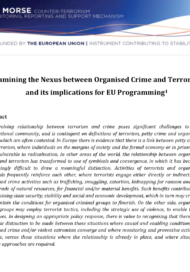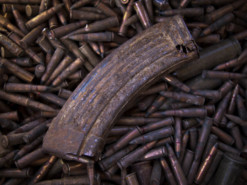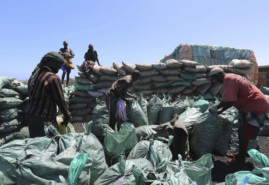Posted on 26 Sep 2017
On 22 September, the Global Initiative participated in “The nexus between terrorism and transnational organized crime: Enhancing understanding and promoting international cooperation”, hosted by the Permanent Mission of the Kingdom of the Netherlands to the UN, as well as the Republic of Colombia and UNODC.
Attended by various counter-terrorism and organized crime experts, policy makers, think thanks, and practitioners, the meeting aimed to raise international awareness on the nexus between organised crime and terrorism by offering a platform to exchange perspectives, approaches and experiences in addressing the nexus, and promote international cooperation in addressing it.
Based on local contexts and motivations of different actors, the linkages between terrorist and organised crime groups are wide-ranging, manifesting in various forms, from mere coexistence between these illicit groups, to cooperation and even convergence. These different linkages make the nexus complex, dynamic and context-based, which has implications for international, regional and national policy and operational responses.
The United Nations (UN) has already recognized and expressed concern over the connection between terrorism and transnational organized crime (TOC), both in the General Assembly (for example in The Convention Transnational Organized Crime and the fifth review of the Global Counter-Terrorism Strategy) and the Security Council (for example resolutions 1373 (2001), 2195 (2014) and most recently 2370 (2017)).
In an effort to address the challenges faced in developing effective response strategies, the meeting served as a stepping stone for the Kingdom of the Netherlands to launch an initiative within the Global Counterterrorism Forum (GCTF) on the nexus between terrorism and TOC. The initiative will aim to develop a set of non-binding good practices, which can serve as the basis for international engagement, assistance, and training to address the potential challenge posed by the nexus between terrorism and transnational organized crime.
Tuesday Reitano, Deputy Director of the Global Initiative, presented a recent paper co-authored by the Global Initiative and the International Center for Counter Terrorism, as members of the EU funded CT-MORSE Consortium. The paper addressed the challenges in viewing terrorist organisations and criminal groups as monolithic and homogeneous entities rather than as complex and multi-dimensional networks. While the relationship between organised crime and terrorism is often political in nature, and a product of the local context and political economy, efforts to counter this phenomenon have largely remained tactical and reactive in nature, with responses primarily driven by law enforcement objectives.
As an alternative, it was suggested that responses be developed through a three-level prevention lens, including identifying enabling macro factors in which criminality and terrorism are more likely to result (such as geo-political environment and marginalization); meso dynamics (such as outbreaks of violence, conflict, widespread social discontent); as well as recognising and avoiding the catalytic “triggers”, or micro conditions, which may prove the tipping point in an individual’s decision-making calculus.
Other panelists including representatives of UNODC, Albania and Colombia, provided regional experiences and offered recommendations for the enhancement of international and inter-agency cooperation, and the development of effective response strategies to address the “OC-Terror Nexus”. These included a call for more research and data collection on the phenomenon, increased analysis as well as greater technical capacity building.




